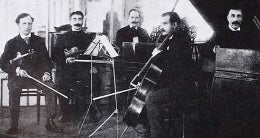
The collection of Lynn Andersen of Bisbee, Arizona, found a new home at the UC Santa Barbara Library last summer. Andersen was a collector of early phonograph recordings and was particularly interested in two-minute wax cylinders, Pathe discs, and foreign recordings. His collection was not huge in size, but had many significant recordings and was expertly curated. In the collection are about 1,200 two-minute cylinders and a similar number of disc recordings. Andersen passed away in November 2015.
The collection is now being cataloged and the cylinders are being systematically digitized and added to the online UCSB Cylinder Audio Archive. One of the highlights of this collection is the approximately 140 Mexican and Cuban cylinders that were originally assembled by the Arreola family of Florence, Arizona Territory, before 1910. These cylinders have a unique provenance in that they have stayed together for over 100 years, first with the Arreola family, later with noted Los Angeles collector Ray Phillips, and eventually acquired by Andersen. Now the collection is housed at UCSB Library, where it will stay together indefinitely and be accessible to the public for research and study.
After acquiring the collection, Andersen wanted to learn as much as he could about the recordings and performers. With scant information available, he conducted his own research on Edison agents’ two main trips to Mexico in 1904 and 1907 and the resulting cylinders that were recorded there. He combed through issues of the Edison Phonograph Monthly for every mention of Edison’s Mexican cylinders. With the collection, Andersen had received a substantial amount of correspondence that Phillips had copied from the archives at the Thomas Edison National Historical Park. From this, Andersen began to piece together the history and significance of the cylinders in the Arreola collection and of Edison’s Mexican cylinders in general. Andersen wrote regular articles for the Soundbox (then the publication of the California Antique Phonograph Society) throughout the 1990s, including articles on the Mexican and Cuban cylinders. With the permission of the Antique Phonograph Society, these articles are now available online with scans of Andersen’s research files related to Edison’s Mexican operations at http://cylinders.library.ucsb.edu/andersen.php
The digitized copies of Andersen’s Mexican and Cuban cylinders have joined over 80 Mexican cylinders already in the UCSB Cylinder Audio Archive. Andersen would take his Edison phonograph to groups to talk about the history and significance of the collection, and play what he felt were significant and exemplary examples from the Arreola collection. In a tribute to Andersen, the playlist that he used in these group presentations, documented in his papers, will also be recreated online as a podcast.
The research and study on these early recordings is far from complete, partly because they are so difficult to find and listen to in any great numbers. We hope providing access to these recordings and documents encourages others to continue Andersen’s work on studying these pioneering Latin American recordings.
Caption: The Mexican ensemble Quinteto Instrumental Jordá-Rocabruna made dozens of recordings for Edison before 1910, and are typical of the international salon orchestra style of the era that was recorded alongside classical, opera and traditional folk musics.


